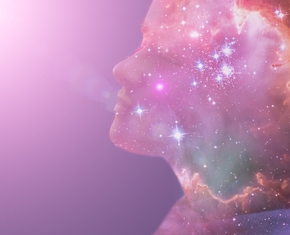The views expressed in our content reflect individual perspectives and do not represent the authoritative views of the Baha'i Faith.
Several years ago my dear wife and sons got me a Golden Retriever puppy for my birthday, and I had to figure out, all over again, how to raise a good dog.
Have you ever raised an animal? I have, especially as a boy, when we always had dogs as pets, companions and hunting animals. My father taught me the old-school way of raising dogs—spare the rod and spoil the canine. His philosophy of dog-raising (and child-rearing, for that matter) involved anger, fright and punishment. If a dog did something “wrong”—bark inappropriately, go to the bathroom in the wrong place or at the wrong time, chew on something unapproved for chewing—he would suffer the scary, Old Testament-style wrath of Dad.
As a consequence, our dogs learned to avoid the punisher, subdue their natures and cower when spoken to. They behaved really well, though. Like broken-spirited children, they obeyed out of fear.
 I didn’t want to raise my new puppy that way. I wanted to show our three sons—who we brought up without violence and corporal punishment—that dogs could benefit from peaceful parenting, too. So we named the pup Odie, read several books on dog-rearing, and resolved to raise him with praise rather than pain. As soon as he was old enough, we enrolled Odie in obedience school, with a trainer who specialized in the new way of training animals: positive reinforcement rather than punishment.
I didn’t want to raise my new puppy that way. I wanted to show our three sons—who we brought up without violence and corporal punishment—that dogs could benefit from peaceful parenting, too. So we named the pup Odie, read several books on dog-rearing, and resolved to raise him with praise rather than pain. As soon as he was old enough, we enrolled Odie in obedience school, with a trainer who specialized in the new way of training animals: positive reinforcement rather than punishment.
How did he do? Well, Odie flunked—twice. He had an exuberant, playful spirit, and despite all the praise and positive reinforcement we heaped on him in obedience school, he wanted to run and romp rather than fetch or stay. But we all learned something interesting from the experience, anyway—Odie had enormous amounts of love and affection to give, to our family and pretty much anyone else who would pet him. Unlike the cowering dogs of my childhood, Odie never met a person he didn’t like. At 130 pounds, this could sometimes backfire, especially if he jumped up to say hi and knocked you over.
Anyone who has had a loyal, affectionate pet can probably relate—we could really feel Odie’s deep regard for our family. At times, that affectionate loyalty felt almost human. So I understood my young son’s question when he asked me one night: “Dad, do dogs have a soul, or a conscience?”
When you try to answer this fascinating question, I found out, you get a wide variety of opinions. Most scientists maintain that mammals like dogs, elephants, primates and dolphins have very high-level cognitive abilities, but lack the spiritual faculties of humans—a soul, a conscience, a transcendent spirit. A small number of contemporary animal behaviorists, however, have begun to conclude that animals do have moral lives. Dale Peterson, who wrote The Moral Lives of Animals, makes this claim: “The function of morality, or the moral organ, is to negotiate the inherent serious conflict between self and others.”
Peterson then concludes that animals, especially those that instinctively group together in packs, flocks or herds, have evolved what he calls “moral” ways of peaceful co-existence. That may be true, but human beings make considered moral choices from a completely different perspective—the empathy that comes from understanding, reflecting on and making judgments, all utilizing an informed conscience. No animal, as far as we’ve been able to discover, has that ability.
A dog certainly has intelligence and emotions, I told my son, and can feel sadness or joy, but lacks the human capacity to ascend the spiritual stages of the conscience and develop a higher-order civilization from that ascent. Dogs can love us, have gentle dispositions and even develop praiseworthy character traits, but they can never have what humans have—a soul, a conscience, a connection with the Divine.
Author and child development specialist Helene Guldberg, in her book “Just Another Ape?” writes:
Human beings have something that no other animal has: an ability to participate in a collective cognition. Because we, as individuals, are able to draw on the collective knowledge of humanity, in a way no animal can, our individual abilities go way beyond what evolution has endowed us with. Our species is no longer constrained by our biology.
…this unique ability to copy complex actions and strategies (even those that the individual doing the copying would never have been able to come up with on their own), along with unique forms of cooperation and an ability to teach, creates the uniquely powerful “ratchet effect” in human culture, whereby gains are consolidated and built on rather than having to be rediscovered. Human beings are not perfect and never will be, but we are special and unique among the animal kingdom. We are capable of making judgements about our own and other people’s behaviour, and have the capacity consciously to change the way we behave and society as whole.
Guldberg and many other scientists agree with the Baha’i teachings:
Man—the true man—is soul, not body; though physically man belongs to the animal kingdom, yet his soul lifts him above the rest of creation. – Abdu’l-Baha, Paris Talks, p. 86.
The human spirit, which distinguishes man from the animal, is the rational soul… – Abdu’l-Baha, Some Answered Questions, newly revised edition, p. 241.
…a lower plane can never comprehend a higher. The mineral kingdom, for example, which is lower, is precluded from comprehending the vegetable kingdom; for the mineral, any such understanding would be utterly impossible. In the same way, no matter how far the vegetable kingdom may develop, it will achieve no conception of the animal kingdom, and any such comprehension at its level would be unthinkable, for the animal occupieth a plane higher than that of the vegetable: this tree cannot conceive of hearing and sight. And the animal kingdom, no matter how far it may evolve, can never become aware of the reality of the intellect, which discovereth the inner essence of all things, and comprehendeth those realities which cannot be seen; for the human plane as compared with that of the animal is very high. And although these beings all co-exist in the contingent world, in each case the difference in their stations precludeth their grasp of the whole; for no lower degree can understand a higher, such comprehension being impossible. – Abdu’l-Baha, Selections from the Writings of Abdu’l-Baha, pp. 46-47.
















Comments
Sign in or create an account
Continue with Googleor